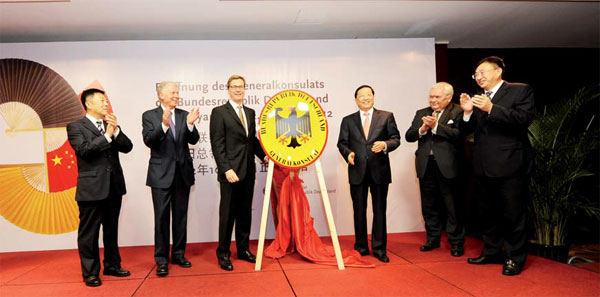Building a strong platform

| The opening of the German Consulate General office in Shenyang in 2012. Provided to China Daily |
keen on promoting more business alliances between Germany and Shenyang
Editor's note: As a federally owned enterprise, the Deutsche Gesellschaft fuer Internationale Zusammenarbeit GmbH, or the German Agency for International Cooperation, is a global service provider in international cooperation and professional training for sustainable development. GIZ operates in 130 countries with 17,000 staff worldwide and provides policy advice, knowledge transfer, capacity building and organizational development support in areas where German know-how is the global leader.
GIZ has more than 30 years of experience in cooperation with China, and 28 years with Northeast China.
Helmut Schoenleber, program director of GIZ, spoke to China Daily on the changes that have happened in Shenyang over the past decades.
Q: What has GIZ done to promote cooperation between Germany and Shenyang?
A: Commissioned by the German Federal Ministry of Economic Co-operation and Development, GIZ has launched projects in China since 1982. We began our first project in Northeast China in 1986, a training center for welding in Harbin. A few years later we started to support the Liaoning Vocational and Technical Education Research Centre in Shenyang.
The Liaoning Employment Promotion and Training Program, in which we have worked closely with our Chinese partners, has helped improve the labor market structure and promoted highly skilled talent training. It has also provided training for business start-ups and initiated a public-private cooperation Project between BMW-Brilliance and vocational schools in Shenyang.
Till date, we have conducted more than 60 symposiums and training programs with more than 2,500 participants.
In 2011, we teamed up with the National Development and Reform Commission to support the new State Council strategy on integration and coordination of economic development in the Northeast. The program has helped improve cooperation between provincial stakeholders and allowed German businesses to forge strong business contacts in Northeast China.
As part of our projects and programs, we have facilitated mutual visits of German and Shenyang officials, experts and entrepreneurs. The German government has established a consulate general in Shenyang, and the Lufthansa airline connects Frankfurt and Shenyang with non-stop flights.
Why are German enterprises interested in investing in Shenyang?
Germany and Northeast China are very similar in climate and in the character and business habits of their people. More and more Germans know about the economic development of the Shenyang metropolitan area as a hub for Northeast Asia. When we did research for our China Liaoning Business Guide we even found that Liaoning was the fastest growing sub-national region in the world. The cooperation between Germany and Shenyang initially focused on big enterprises such as BMW and Brilliance, but the center of attention is now shifting to small and medium enterprises.
What, in your opinion, does Shenyang need to do to attract more overseas investment?
Foreign enterprises need a lot of overseas talent. So it is important for Shenyang to create more facilities like international schools, international food and entertainment options, and convenient public transport. Foreigners and Chinese alike also love clean air, so the city should do something to improve its air quality.
Foreign enterprises also need a strong vocational training system trimmed to their specific needs.
Shenyang has been looking at the experience of the German Ruhr region and adopted some of the lessons learnt. There is still much more to be exchanged. A first step could be to increase the twinning between Shenyang and Duesseldorf and between Liaoning and Baden-Wuettemberg.
(China Daily European Weekly 04/11/2014 page16)
Today's Top News
- Takaichi must stop rubbing salt in wounds, retract Taiwan remarks
- Millions vie for civil service jobs
- Chinese landmark trade corridor handles over 5m TEUs
- China holds first national civil service exam since raising eligibility age cap
- Xi's article on CPC self-reform to be published
- Xi stresses improving long-term mechanisms for cyberspace governance































